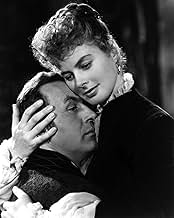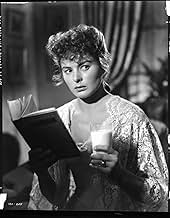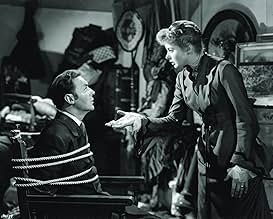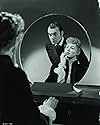Dix ans après que sa tante a été assassinée dans leur maison de Londres, une femme revient d'Italie pour reprendre la résidence avec son mari. Son intérêt obsessionnel pour la maison découle... Tout lireDix ans après que sa tante a été assassinée dans leur maison de Londres, une femme revient d'Italie pour reprendre la résidence avec son mari. Son intérêt obsessionnel pour la maison découle d'un secret qui peut rendre sa femme folle.Dix ans après que sa tante a été assassinée dans leur maison de Londres, une femme revient d'Italie pour reprendre la résidence avec son mari. Son intérêt obsessionnel pour la maison découle d'un secret qui peut rendre sa femme folle.
- Réalisation
- Scénario
- Casting principal
- Récompensé par 2 Oscars
- 10 victoires et 7 nominations au total
- Miss Thwaites
- (as Dame May Whitty)
- Policeman
- (non crédité)
- Young Girl
- (non crédité)
- Cab Man
- (non crédité)
- Pedestrian
- (non crédité)
- Pedestrian
- (non crédité)
Avis à la une
When Paula was younger, her aunt with whom lived with in Thornton Square in London was murdered by a strangler roaming the streets. Paula goes to stay in Italy, and some time later, meets Gregory. She and Gregory plan to marry, and after they do, they move to London, back to the exact house Paula lived in.
Not too long after, Paula starts to become "forgettful," as Gregory tells her. In fact, he tells her a lot of things...and she believes him. Then things she knows she had put somewhere or remembered doing seem nonexistent, and Paula is left to wonder if her sanity is in check. Then, many times, she starts hearing footsteps, and the gaslights are going down a lot. Is Paula going crazy, or is she being haunted by her dead aunt's spirit...or is it something far more sinister?
I liked this movie a lot. Ingrid Bergman and Charles Boyet were amazing. Bergman portrays her character's emotions to the point that you feel the same way she does. And Boyet is pure evil in this one. Many times watching this, I was thinking, "He is so terrible to her!" It was so psychological, how everything eveloped. The best scene in the whole movie took place at the reception, when Gregory tells Paula he lost his watch, and then finds it in her purse. Then she bursts into tears, and it was so absolutely amazing how the scene was pulled off. In fact, it was so subtle it was scary. You wouldn't expect a missing watch found in her purse to be such a big deal, but it is such a strong scene.
The one thing I didn't like about this otherwise nearly flawless movie was the climax. It was just too dull to me, and the only part I really liked was Paula's wicked sarcasm towards Gregory while they're in the attic. She truly did deserve the Best Actress Oscar for her acting, but nothing could mask the fact that the climax was just too weak. If it had a bit of a touchup, this movie would be perfect.
All in all, I recommend this without hesitation. It is absolutely amazing, and I could watch it again and still enjoy it, and that is quite rare for me. So, I recommend you find this wherever you can and give it a chance. It's a classic.
This was not the first adaptation of Mr. Hamilton's play, although in our humble opinion, it is much better than the previous account, in part helped by the great cast that Mr. Cukor assembled to portray these characters. Thanks to the magnificent black and white cinematography by Joseph Ruttengerg and the musical score by Bronislau Kaper, the film ultimately rewards the viewer.
We are taken to No. 9 Thornton Square, at the start of the film. A murder of a famous opera singer has been committed. We watch as a young woman is taken away. Paula, is being sent away to Italy to recuperate from the tragedy she has just witnessed. The idea was for her to follow her aunt, the murdered diva's footsteps, but just listening to the young woman sing, one realizes opera is not going to gain a new star.
The young pianist, Greorgy Anton, who is seen at Maestro Gardi's home, seems to be in love with Paula; she, in turn, has fallen in love with this much older figure. They prepare to return to London and live in the house at Thornton Square. Paula, alas, is not too happy because of her traumatic experience there. Little by little we watch as Gregory, now in charge of the household, begins to terrorize his wife. The key seems to be hidden in the attic where all the things that belonged to the late diva has been stored.
A young man living near the Antons, Brian Cameron, takes an interest in what he sees is definitively wrong with the woman at No. 9, and takes things into his own hands. It's through this man's intervention that Paula is able to see all that has been inflicted upon her. Whatever Gregory has done, succeeded in giving Paula a deep sense of insecurity and fear.
Ingrid Bergman, who makes a magnificent Paula, was born to play this troubled woman. She is seen as a young girl at the beginning of the film, then as a blossoming beautiful woman and at the end she is transformed into a person afraid of her own shadow. One look into Ms. Bergman's eyes and we know what's going on in her mind. She conveys all the emotions convincingly. There's not a thing wrong with her performance.
Charles Boyer also makes a great Gregory Anton, a man who is duplicitous and sly, with a hidden agenda to get whatever he can out of poor Paula. Gregory is an evil man who will go to great lengths to get what he wants. Gregory Anton offered the actor one of his best characters. His chemistry with Ms. Bergman is wonderful.
The other supporting characters are well performed, especially by a young and interesting Angela Lansbury, who plays the parlor maid, Nancy. Joseph Cotten, on the other hand, seems to be out of character as Brian Cameron. His American accent ruins his appearance and we don't believe in him. Dame May Witty is about the sunniest one in this film.
"Gaslight" is an excellent way to spend the time in the company of Ingrid Bergman and Charles Boyer, thanks to the detailed production directed by George Cukor.
GASLIGHT is richly atmospheric, mostly well-acted, and beautifully photographed. There are chills aplenty as seemingly innocent people grow progressively creepier, and the movie is well-paced with each successive scene increasing Paula's terror. The climax is tense and has a certain poetic justice to it.
The chief flaw in the movie is that we are clearly shown from the beginning that Paula is the victim of a third party and is not insane. Thus we cannot share the doubts and terror that she feels. We are not, like her, wondering if we can trust our senses, but merely wondering who is doing this to her. And the latter question isn't very challenging to answer. With a little more subtlety, Cukor could have left us as much in the dark as Paula about why she is experiencing so many strange phenomena, and made this effective little film into a true masterwork of suspense. As it is, GASLIGHT is good, but fails to achieve its potential to match such classics as REBECCA or VERTIGO.
Bergman and Boyer make a very dynamic on-screen duo. The film does suffer from Joseph Cotten, whose apple-pie American accent makes for a very unconvincing Scotland Yard inspector. Angela Lansbury is delightfully saucy in her film debut as a Cockney maidservant. Dame May Whitty provides effective comic relief.
GASLIGHT is well worth a rental at any price, so long as your expectations aren't overly high.
Rating: *** (out of ****).
Great performances all round.
The actress -- who would soon become blacklisted after her marriage to Italian director Roberto Rossellini -- can convey every emotion and nuance of her character through her amazingly expressive eyes. Completely believable in George Cukor's Gaslight as a wife whose husband (Charles Boyer) is trying to make insane, Bergman can show you all her turmoil and emotional stress just by looking around.
The plot is simple, perhaps even arcane. A famous opera singer is murdered in London, leaving behind no motive, no clues, and Paula, the young niece who discovered the body. Paula is sent to Italy, where she, too, studies music, until she elopes with an older, dashing pianist (Boyer). He convinces her to move back to the exact same house where her aunt was murdered, where nothing has been changed in all those years. And, naturally, here is where the movie really begins.
Soon, her husband starts acting very strangely, and starts convincing her that she is very ill and unable to go out. Trapped in the house, alone with her husband, a somewhat-deaf cook, and a tart of a housekeeper, Paula soon starts to hear noises, see things, lose things, and even hide things. Or is she? Is she going mad? Or is her husband -- who she is supposed to love, honor, and obey -- making her mad?
The show is Bergman's to steal, and she does so with gusto, garnering an Oscar for her endeavor. With her performance, Bergman transforms the character of Paula Alquist from a weak, paranoid wimp of a wife into a woman struggling with her own identity and her role in marriage and society. Perhaps unintentionally, perhaps unwittingly, Bergman's Paula is a symbol and a superhero for all women trapped in an abusive marriage. Even today.
Granted, the story line is somewhat contrived, and one can't help but wonder how Paula never notices that her husband is completely evil BEFORE the marriage. Also, Joseph Cotten, as the Scotland Yard detective smitten with Paula's beauty, seems to come out of nowhere. Still, the acting prevails over the plot, and what better actor to come out of nowhere than Cotten? His charm and charisma make up for his character's two-dimensionality.
Although there are faults, Gaslight is an extraordinary film, generating its suspense not from an evil lurking in the shadows, but from the psychology of the mind itself. Perhaps one of the first "pure" psychological thrillers, Gaslight, just like Ingrid Bergman's eyes, contains the perfect blend of mystery, suspense, and beauty.
Le saviez-vous
- AnecdotesWhen this movie was produced, MGM attempted to have all prints of the previous version, Hantise (1940), destroyed. These efforts were ultimately unsuccessful, though the movie was rarely seen for the next few decades.
- GaffesWhen Paula finds the letter in her aunt's music score, Gregory crumples up the letter and jams it into his pocket. Later, when she finds the letter in Gregory's desk, it's neatly folded, with no evidence of crumpling.
- Citations
Paula Alquist Anton: If I were not mad, I could have helped you. Whatever you had done, I could have pitied and protected you. But because I am mad, I hate you. Because I am mad, I have betrayed you. And because I'm mad, I'm rejoicing in my heart, without a shred of pity, without a shred of regret, watching you go with glory in my heart!
- Crédits fousThe opening and closing credits are displayed over a background of a burning gaslight. If you look at the shadow on the wallpaper, you see a man strangling a woman.
- Versions alternativesExists in a computer-colorized version.
- ConnexionsEdited into Hollywood: The Dream Factory (1972)
Meilleurs choix
- How long is Gaslight?Alimenté par Alexa
Détails
- Date de sortie
- Pays d’origine
- Langues
- Aussi connu sous le nom de
- Luz que agoniza
- Lieux de tournage
- Société de production
- Voir plus de crédits d'entreprise sur IMDbPro
Box-office
- Montant brut mondial
- 2 391 $US
- Durée1 heure 54 minutes
- Couleur
- Rapport de forme
- 1.37 : 1
Contribuer à cette page




































